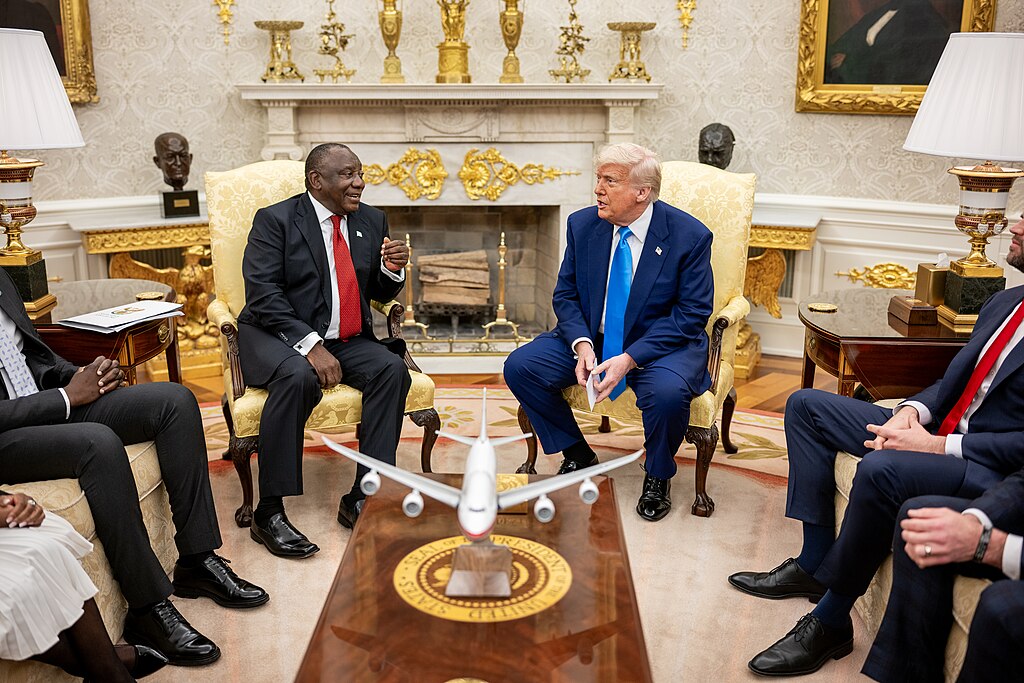
How does a leader respond to provocative claims that threaten his country’s global reputation? On Wednesday, May 21, South African President Cyril Ramaphosa met with U.S. President Donald Trump in the White House. Trump soon pivoted from his welcome remarks, accusing South Africa of committing genocide and engaging in widespread violence against white farmers. Trump’s Oval Office ambush created a diplomatic dilemma for Ramaphosa: How could he correct the misinformation without escalating tensions?
This second ambush at the White House seemed a close parallel to Trump’s Feb. 28 confrontation with President Volodymyr Zelenskyy of Ukraine. As that meeting fell apart, Zelenskyy left the White House abruptly. Two months later, many lauded Ramaphosa’s calm response and measured remarks in a room filled with press cameras and reporters. Some South Africans were critical, however, that their president would subject himself to such a “pointless exercise” as rebutting Trump’s baseless allegations.
Where do Trump’s false claims about violence targeting white farmers come from? And how should we evaluate Ramaphosa’s calm response? Here’s what you need to know.
Background of the allegations
Trump’s allegations about a “genocide” against white farmers in South Africa are unfounded – yet the story often resurfaces in discussions about the country’s new land policies. South Africa’s long history of apartheid, which enforced racial segregation and severely limited land ownership for non-white South Africans, left the country with deeply entrenched racial and economic inequality. After the end of apartheid in 1994, the government began efforts to redistribute land to Black South Africans, aiming to correct the injustices of the past. However, the slow pace of land redistribution has sparked tensions, including among white farmers, who feel their property is under threat.
Trump’s claim about genocide took root in the narrative promoted by some critics of South Africa’s land policies, who suggest that the government’s efforts are driving white farmers out through violence. While it is true that some farmers have faced attacks, there’s no coordinated campaign of racial violence – or genocide. These claims are an exaggeration, and do not reflect the reality of the rural situation, which is far more complex, involving poverty, crime, and disputes over land ownership.
Trump’s decision to amplify this false narrative in 2025, and issue an executive order creating a refugee program for Afrikaner farmers, further worsened relations between the two countries. His genocide allegations distorted the facts – and the U.S. decision to freeze aid to South Africa furthered bilateral tensions.
Ramaphosa kept his cool
Ramaphosa responded by correcting Trump’s false claims, stressing that there is no racial agenda behind South Africa’s land policies. He addressed a clip in the video Trump showed in the Oval Office that included a controversial speech made by Julius Malema, leader of the Economic Freedom Fighters (EFF). The EFF is a far-left political party in South Africa known for its radical stance on land redistribution. The South African president emphasized that Malema’s negative rhetoric of “kill the boer, kill the farmer,” does not reflect the official policies of his government.
Ramaphosa made it clear that while South Africa’s multi-party democracy allows for a diversity of opinions, the government is firmly against any form of incitement to violence. He reiterated that South Africa’s land policies focus on reconciliation and peaceful land redistribution, aiming to address historical injustices. Ramaphosa also pointed out that Malema’s views are those of a small, minority party – and that these views do not align with the South African government policies, which are centered on unity and peace. Ramaphosa also invited others in his delegation to comment, including South Africa’s Minister of Agriculture John Steenhuisen, who emphasized that the country is focused on fighting crimes against farmers but also stressed the need for investment and economic progress. Bringing in prominent figures from various sectors, such as business leaders and even golfers, helped to showcase a broad, unified response to Trump’s allegations.
The importance of calm authority in leadership
Instead of reacting defensively or emotionally to Trump’s baseless allegations, Ramaphosa carefully corrected the misinformation, emphasized that violence in the country was driven by criminal activity – not racial hatred – and reaffirmed South Africa’s commitment to peaceful land solutions. His measured response helped prevent the Oval Office ambush from spiraling into a diplomatic crisis. Ramaphosa took the opportunity to broaden the global public’s understanding of the situation, emphasizing that the South African government is focused on addressing farm attacks and rural security as part of a broader effort to combat crime and violence.
Ramaphosa’s response clarifying the misconceptions aligns with research showing that political elites can choose to ignore, rebut, or embrace allegations when confronted with them. A study by political scientist Zim Nwokora identifies when each strategy is most effective and highlights the importance of rebutting false claims to preserve a leader’s position and counter misinformation. In this case, Ramaphosa’s rebuttal of Trump’s allegations achieved this goal by clarifying South Africa’s stance and preventing further escalation. And research by Scott Radnitz further supports this approach, emphasizing that rebutting conspiracy theories can allay political tensions and influence public discourse more effectively than ignoring or embracing them.
Given Zelenskyy’s February run-in with Trump, Ramaphosa may have had some clues about what to expect in the Oval Office. His interactions with Trump demonstrate how calm conversations, even with disagreements, can help reduce polarization and better inform the public.
Kelechi Amakoh is a 2025-2026 Good Authority fellow.

